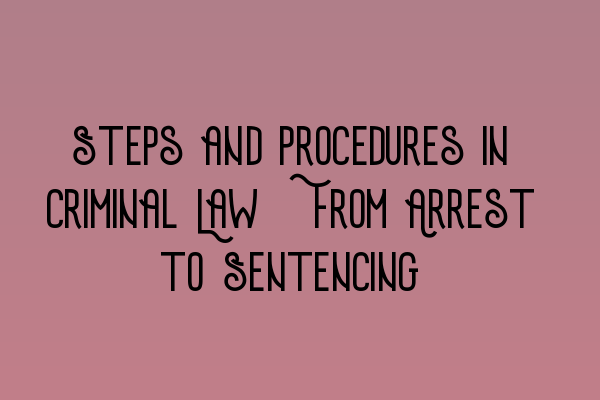Steps and Procedures in Criminal Law: From Arrest to Sentencing
Welcome to SQE Criminal Law & Practice Law UK, where our expert solicitors guide you through the intricate
steps and procedures of criminal law. In this comprehensive guide, we will walk you through each stage of the
criminal justice system, from the initial arrest to the final sentencing.
1. Arrest
The first step in the criminal process is the arrest of a suspect. This occurs when a law enforcement officer
has reasonable grounds to believe that an individual has committed a criminal offense. During the arrest, the
suspect is informed of the charges against them and their rights, including the right to legal representation. It
is crucial to understand the importance of seeking legal advice from a qualified criminal solicitor at this
stage.
2. Police Investigation
After the arrest, the police will conduct a thorough investigation to gather evidence and build a case against the
suspect. This may involve interviewing witnesses, collecting physical evidence, and analyzing forensic
materials. It is essential to cooperate with the police, but also to seek legal advice to protect your rights and
ensure a fair investigation.
3. Charging Decision
Once the police investigation is complete, the evidence is reviewed by the Crown Prosecution Service (CPS) to
determine whether there is enough evidence to proceed with a prosecution. If the CPS believes there is sufficient
evidence, they will make a charging decision and formally charge the suspect with the alleged offense.
4. Court Appearance and Bail
After being charged, the suspect will have their first appearance in court. During this initial court appearance,
the charges are read, and the suspect may enter a plea of guilty or not guilty. The court will then consider
whether to grant bail or remand the suspect in custody until the trial. It is crucial to have legal representation
during this time to navigate the complexities of the legal process and ensure a fair bail hearing.
5. Pre-trial Proceedings and Disclosure
Pre-trial proceedings involve the exchange of information between the prosecution and the defense. This process,
known as disclosure, ensures that both sides have access to all the evidence that will be presented during the
trial. It is vital to review the disclosed evidence carefully with your solicitor to prepare a robust defense
strategy.
6. Trial
The trial is the central stage of the criminal justice system, where the prosecution presents their case, and the
defense challenges the evidence. Witnesses may be called to give testimony, and experts may provide their
opinions. It is essential to have a skilled criminal solicitor who can effectively advocate for your rights and
present a compelling defense.
7. Verdict and Sentencing
After the trial, the jury or judge will deliver a verdict of guilty or not guilty. If the verdict is guilty, the
court will proceed to the sentencing stage. Sentencing can vary depending on the severity of the offense and
other mitigating or aggravating factors. Your solicitor can guide you through this stage and advocate for a fair
and just sentence based on the circumstances of your case.
Conclusion
Understanding the steps and procedures in criminal law from arrest to sentencing is crucial to navigate the
criminal justice system successfully. At SQE Criminal Law & Practice Law UK, our team of expert solicitors is
here to support and guide you through every stage of the process. If you require legal representation or
advice, don’t hesitate to reach out to us.
Related Articles:
